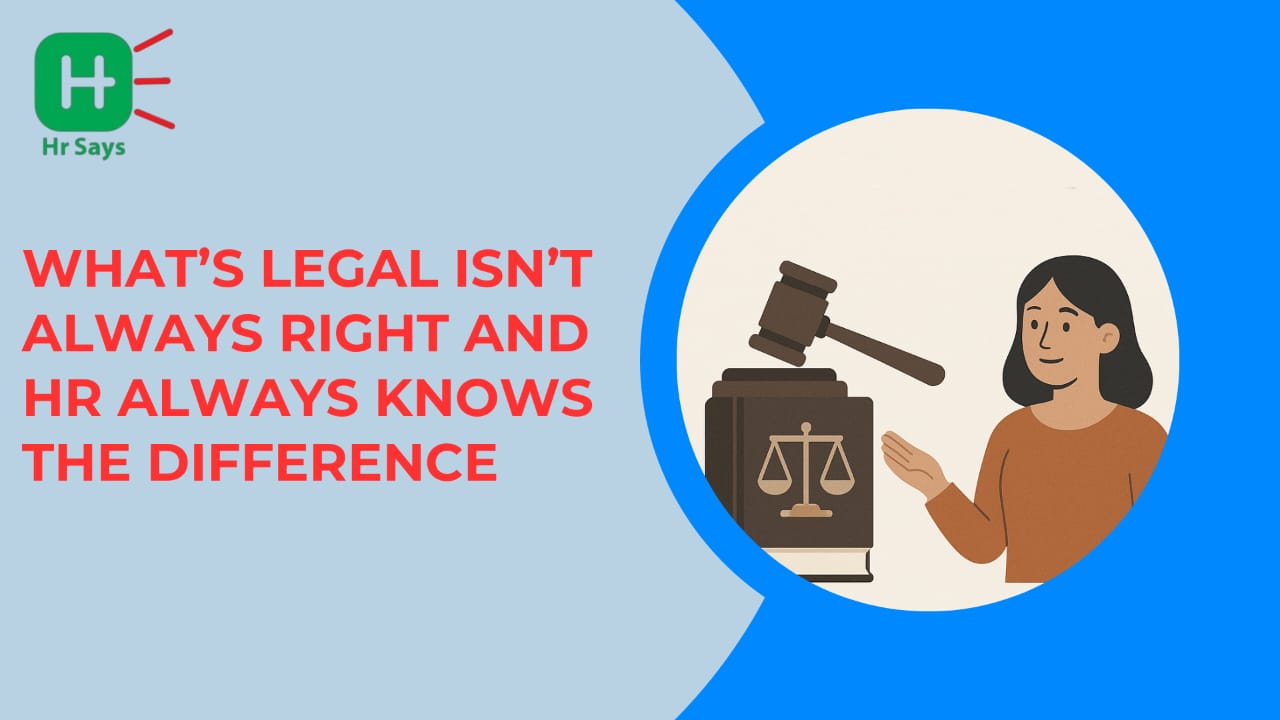The handbook sits on the shelf, thick and untouched. The clauses are neatly written, the footnotes accurate, the laws complied with. And yet, in the HR cabin, there’s a conversation unfolding that no regulation can guide. A manager used a condescending tone again. An employee was denied leave after a miscarriage. A brilliant woman was passed over for promotion again because “she might not stay long.” None of this illegal. All of it wrong.
Therein lies the heavy, silent wisdom of HR. In the grey space between legality and humanity, where documents fall short and values must take over, HR quietly becomes the keeper of the moral compass. Because not every dilemma at the workplace comes with a legal answer. Some come with a question that starts with, “But is this fair?”
In a world obsessed with compliance, there’s a dangerous comfort in doing only what is required. But cultures are not built on checklists. They are built on character. And often, the only team brave enough to speak when something “doesn’t feel right” is HR. Not because it’s easy, but because someone has to.
Modern workplace dilemmas don’t always break the law. They break trust. They break spirit. And HR, more than anyone else, sees the slow erosion that no legal clause captures. The person who never files a complaint but quietly disengages. The “culture fit” excuse used to mask bias. The laugh that covers discomfort in meetings. These are the unseen, unrecorded moments where HR ethics step in, not to file paperwork, but to ask the deeper question: what are we allowing here?
Consider the rise in performance monitoring tools that track mouse movement, log hours, take screenshots. Perfectly legal. But is it right to treat adults like potential threats? Is surveillance truly a performance strategy or a failure of leadership? When HR brings such concerns to the table, it’s not resisting progress; it’s defending dignity.
Or take internal complaints that don’t meet the threshold of legal harassment. A colleague who constantly talks over others, a manager who pressures employees to answer emails on weekends, or subtle exclusion from team decisions none of it lawsuit worthy but all of it is culture destroying. And in these moments, HR must decide weather to wait for the law to catch up, or lead with what’s right?
The most respected HR leaders aren’t known for memorizing every clause of labor law. They’re known for recognizing when something is just off. When a policy is being used to punish, not protect. When a rule is being applied equally but not equitably. When silence from leadership is doing more damage than the offense itself. That’s not something you learn from legal manuals. That’s something you understand when you listen, deeply, to your people.
HR ethics is not about dramatizing minor issues. It’s about identifying the patterns that policies ignore. It’s about connecting the dots between absenteeism and toxic leadership. It’s about holding space for uncomfortable truths that never make it to court but shape your employer brand every single day.
And let’s not forget that employees are watching. Today’s workforce, especially Gen Z and millennials, don’t just judge a company by its perks or pay. They look at how it responds to the subtle tests of ethics. Do you defend the loudest voice or the lone, unheard one? Do you hide behind rules, or do you rewrite them when they’re outdated?
In this evolving landscape of employee rights and labor law, HR must wear more than one hat. The legal advisor, yes. But also the cultural guardian. The silent witness. The subtle rebel. And sometimes, the lone voice in the room saying, “We can do better than this.”
Real impact is made not when HR follows rules but when it shapes them to reflect the values the company claims to live by. It’s when HR doesn’t wait for a court ruling to fix a broken culture. It’s when HR steps in, not because the law says so, but because the people need it. This work is quiet. It won’t always be applauded. It might be misunderstood. But it matters.
Because years from now, when the brand is being celebrated for its “people-first” culture, few will remember the exact policies. But they will remember the way HR stood up for what was right, even when it wasn’t legally required. What’s legal isn’t always right. And the best HR professionals have always known the difference

 People will remember the way HR stood up for what was right, even when it wasn’t legally required. What’s legal isn’t always right. And the best HR professionals have always known the difference.
People will remember the way HR stood up for what was right, even when it wasn’t legally required. What’s legal isn’t always right. And the best HR professionals have always known the difference.








.jpeg)
.jpeg)

.jpeg)





.jpeg)



.jpeg)

.jpeg)



